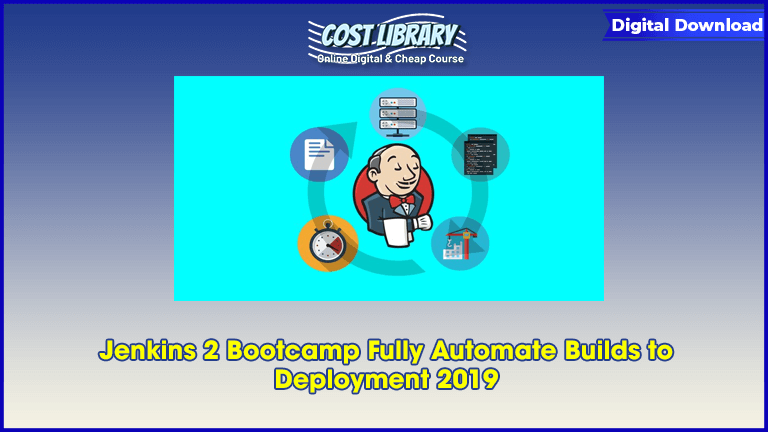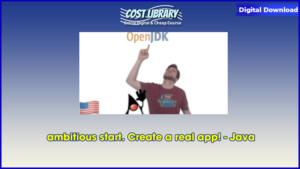Jenkins 2 Bootcamp Fully Automate Builds to Deployment 2019
What you’ll learn
Install Jenkins CI server on Windows
Install and configure several tools commonly used with Jenkins
Understand the basics of continuous inspection, continuous integration, and continuous deployment
Use Jenkins effectively to build, test, analyze and deploy Java projects
Apply the techniques and experience to implement Jenkins and/or a continuous integration system
Course content
Expand all 86 lectures06:23:49
–Introduction
16:33
Welcome: Course Objectives and Overview
Preview
02:46
Course Focus and Approach
Preview
02:30
Build Maturity
Preview
03:10
What is Jenkins?
Preview
03:54
About the Instructor
Preview
04:13
–Full Installation
33:07
Overview
02:57
Windows Installation
10:09
Mac Installaiton
09:35
LInux Installation
10:26
–The Basics
39:47
The Basics Overview
Preview
00:57
The First Job
Preview
05:09
Jenkins Dashboard
Preview
03:05
Failing Jobs
Preview
04:02
Copy and Rename Jobs
Preview
05:56
Update Plugins
Preview
08:09
Delete a Job
Preview
02:37
Manage Jenkins
04:37
Jenkins Configuration
Preview
05:15
–Maven Projects
44:36
Maven Projects Overview
Preview
01:14
Confirm Maven Project Outside Jenkins
Preview
04:46
Maven Freestyle
07:52
Jenkins Workspace
Preview
02:48
Maven Jobs
Preview
05:35
Maven Build Modules
Preview
02:34
Failed Maven Projects
Preview
02:50
Scheduling Jenkins Jobs
Preview
03:12
Source Control Polling in Jenkins
Preview
03:13
Jenkins Tabs
Preview
02:54
Jenkins Home Directory
Preview
02:40
Upgrading Jenkins
04:58
–Tests and Quality Analysis: Continuous Inspection
40:25
Continuous Inspection Overview
Preview
00:55
Project Source Review (Unit Tests and updates for quality analysis)
Preview
07:44
Quality Analysis Plugins and Configuration
Preview
04:06
Build and Review
02:52
Unit Testing in Jenkins
Preview
05:37
Reviewing Quality Analysis
Preview
06:45
Enforcing Minimum Quality Scores
Preview
07:17
Improving Quality Scores
Preview
05:09
–Publishing Build Artifacts to an Artifact Repository
09:33
Publishing Overview
Preview
01:07
Maven Repository Plugin and Configuration
02:38
Build and Review Artifact Publishing
05:48
–Build Artifact Deployment with Jenkins
17:25
Deployment Overview
01:30
Tomcat Installation
07:23
Deployment Plugin
04:51
Deployment
03:41
–Security in Jenkins
29:10
Security Overview
01:29
Manually Disable Security
03:01
Enable Security and Login
04:26
Adding Users in Matrix-Based Security
08:29
Users Role
06:29
Project Role
05:16
–AWS Lightsail for Jenkins Production
01:31:02
Jenkins Production Using Lightsail Overview
Preview
05:20
AWS Signup
Preview
02:40
Course Repository
03:48
Jenkins Instance
08:34
Static IP Address and DNS
08:29
Instance Access
05:16
Jenkins Setup
05:45
Restart within Lightsail
04:10
Instance Snapshots
02:28
Instance Flip
10:52
Clean Up
02:17
Update HostKey
02:14
Web Secured, Part 1
12:14
Web Secured, Part 2
06:29
Update Jenkins
06:15
Beyond Lightsail
04:11
–Course Errata and Updates
13:57
Jenkins Incompatibility with Java 9, 10 and 11
01:41
Known Issue: Maven Projects Fail with POM Parse Error
03:51
Maven Repository Server plugin causes Build Failure
03:17
Resolve Problem with MacOS Upgrade Breaking Git (new!)
05:07
3 more sections
Requirements
Basic computer skills
Ability and access to install software (admin rights required)
Desire to learn something new
Description
This is a comprehensive course designed to show how to setup and run a Jenkins CI server starting with continuous inspection (build, test and analysis) all the way through to continuous deployment. This course provides a strong foundation for implementing continuous inspection, continuous integration, continuous delivery, and even continuous deployment at your company or studio. In order to ikeep the course short and to-the-point, several decisions were made in order to provide a complete path from CI to CD.
The pipeline created in this course consists of the following:
Jenkins CI server installed and configured on Windows
Git as the source control system
Java as the main programming language of build projects
Maven as the build tool
Findbugs, PMD, and Checkstyle as the static code analysis tools
Tomcat as the deployment server
This set of tools provides a comprehensive, end-to-end implementation continuous deployment pipeline. Jenkins can be installed on many operating systems and supports a myriad of tools and technologies — which means, this course provides tremendous value to those comfortable or interested in other operating systems and/or technologies.
Course Outline
Introduction provides an overview for the course, which leas to the Core Concepts for Jenkins. This provides a foundation for the remainder of the course.
Installation provides step-by-step instructions on how to setup Jenkins and all the related tools specifically on Windows. The same principles are applicable to other operating systems as well.
The Basics provides a first look at Jenkins at work with a very simple “freestyle†project. This allows us to learn the Jenkins interface and the key features it provides.
After that, we dive into Maven Projects specifically — since Jenkins natively understand Maven and thus provides special features for Maven projects.
Jenkins can do so much more than simply building. In Test & Quality, we hook up a standard set of unit testing and quality analysis tools for Java projects. Then, we use that information to affect the build status based on established standards.
We also cover how to use Jenkins as an artifact repository which is used to store the build artifacts, like jars and wars, after successful builds. This is particularly useful when integrating Jenkins with other tools in a more comprehensive software delivery strategy.
Then, we bring everything together for Deployment to a running Tomcat server. Don’t worry, I’ll walk you through the complete setup and configuration to work seamlessly with Jenkins!
Finally, no course would be complete without talking about Security. In this final chapter, we setup Jenkins to allow users to login and only see their projects.
Course Features
Presentations provide audio/video training of conceptual ideas in each major area or introduction of new concepts.
Screencasts provide a video of the instructor’s computer system with any actions, commands, or screens displayed and narrated. There are several hours of screencat video content — it makes up the vast majority of the course. Any command line based screencast will include a command listing in the lecture downloads.
Who this course is for:
Developers, software engineers, and programmers wanting to avoid “it works on my machine†syndrome
IT professions looking to implement continuous inspection through continuous deployment at their company
IT management that wants to have a deeper understanding of Jenkins and other DevOps concepts
DevOps (Development/Operations) professional looking at Jenkins as a build tool or as part of a larger software delivery pipeline








